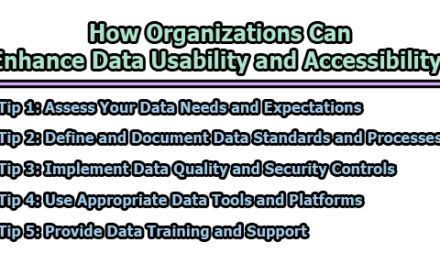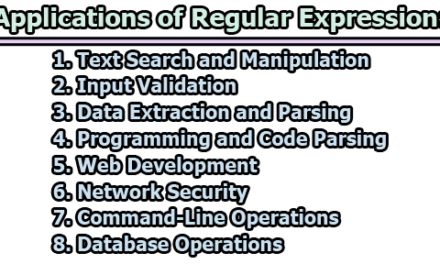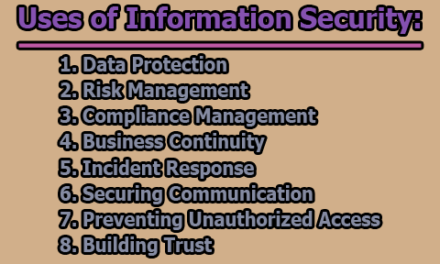Advantages and Disadvantages of Implementing Information Security:
Information security is a crucial component for organizations in the digital age, where data plays a central role in daily operations. Implementing robust information security measures is essential for safeguarding sensitive data, protecting against cyber threats, and ensuring the integrity of systems. While there are numerous advantages to adopting comprehensive information security practices, it is essential to consider potential drawbacks as well. This discussion explores the advantages and disadvantages of implementing information security to provide a holistic understanding of the impact on organizations.
Advantages of Implementing Information Security:
1. Protection of Sensitive Data: One of the primary advantages of information security implementation is the protection of sensitive data. Robust security measures, such as encryption and access controls, safeguard critical information from unauthorized access, ensuring confidentiality.
2. Risk Mitigation: Information security practices help organizations identify and mitigate potential risks. Proactive risk management reduces the likelihood of security incidents and minimizes the impact of any breaches that may occur, safeguarding the organization’s reputation.
3. Compliance Adherence: Implementing information security measures ensures compliance with legal and regulatory requirements. This not only prevents legal consequences but also instills confidence in customers and stakeholders that the organization operates within established guidelines.
4. Business Continuity: Information security contributes to business continuity by protecting systems and data from disruptions. In the event of a security incident or disaster, well-implemented security measures enable quicker recovery, reducing downtime and preserving operations.
5. Enhanced Productivity: A secure environment fosters enhanced productivity by minimizing disruptions caused by security incidents. Employees can focus on their tasks without concerns about data breaches or cyber threats, leading to a more efficient and stable work environment.
6. Cost Savings in the Long Run: While the initial implementation of information security measures incurs costs, the long-term benefits often outweigh these expenses. Preventing data breaches, legal consequences, and reputational damage results in significant cost savings over time.
7. Improved Stakeholder Trust: Information security builds trust with customers, partners, and stakeholders. Demonstrating a commitment to protecting sensitive information enhances the organization’s reputation and fosters trust among those who interact with the business.
Disadvantages of Implementing Information Security:
1. Upfront and Ongoing Costs: A notable disadvantage of information security implementation is the upfront and ongoing costs associated with technology, training, and maintenance. These expenses can strain organizational budgets, particularly for smaller businesses.
2. Potential for Inaccurate Classification: Misclassification of information may occur, leading to either over-protection or under-protection. Over-classification may impede productivity, while under-classification can expose sensitive data to unauthorized access.
3. Lack of Adaptability: Rapid technological advancements and changes in business processes may render existing security measures obsolete. Lack of adaptability can result in vulnerabilities, as security systems struggle to keep pace with evolving threats.
4. Resistance to Change: Employees and stakeholders may resist changes introduced by information security measures. Resistance to new protocols, procedures, or technologies can hinder successful implementation and compromise security effectiveness.
5. False Sense of Security: Overreliance on information security measures can create a false sense of security. Organizations may assume they are fully protected, neglecting the importance of continuous monitoring and improvement.
6. Maintenance Challenges: Information security measures require continuous maintenance and updates to remain effective. Failure to regularly update security protocols can lead to vulnerabilities and compromise the effectiveness of the overall security framework.
7. Complexity of Implementation: Implementing comprehensive information security measures can be complex, especially for large organizations. Complexity may lead to difficulties in managing and maintaining security systems, increasing the risk of oversights or misconfigurations.
In conclusion, the advantages of implementing information security, such as data protection, risk mitigation, and enhanced trust, are crucial for the success and longevity of organizations in a digitally driven world. However, it is essential to acknowledge the associated challenges, including costs, potential resistance to change, and the need for ongoing maintenance. Striking a balance between security and operational efficiency is key. Organizations must approach information security as a dynamic and evolving aspect of their business strategy, adapting to emerging threats while leveraging the benefits of a secure environment to foster trust and productivity.

Library Lecturer at Nurul Amin Degree College










